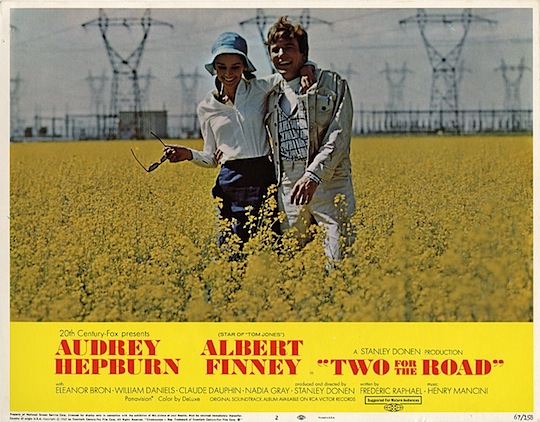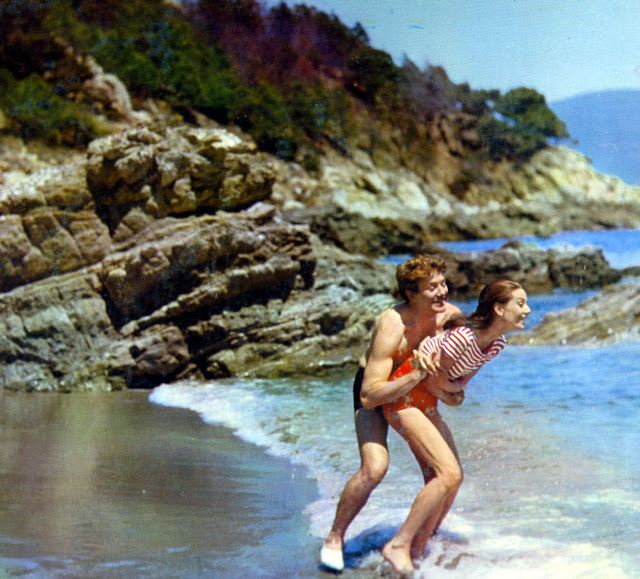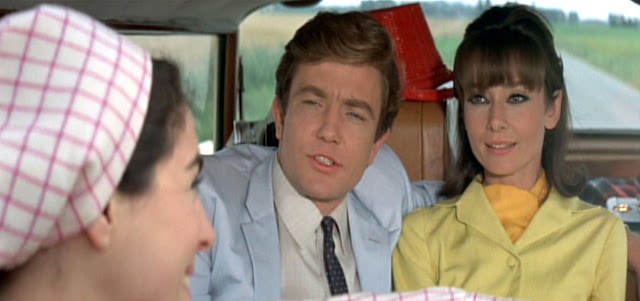 |
| Movie poster for Two for the Road |
Written by Myrna Waldron.
Two For The Road’s nonlinear narrative follows the courtship and marriage of Mark (Albert Finney) and Joanna Wallace (Audrey Hepburn) over a period of 12 years. In the present day, the Wallaces are preparing to go to a party celebrating a house that workaholic architect Mark has designed. As they pass by a church holding a wedding, they look inside the car and find the bride and groom looking utterly miserable. Joanna comments, “They don’t look very happy.” Mark replies, “Why should they? They just got married.”
The Wallaces’ marriage is fractured and close to the breaking point. They think back to the various road trip vacations they’ve taken together, and reflect on just where things went wrong, and why. The Joanna of 10 years ago is a conservatively dressed young woman who is a member of a travelling choir. Mark is travelling on his own to do research on European architecture. They are brought together by chance–Joanna’s entire troupe has come down with chicken pox, and Mark was hoping to fool around with one of the more flirtatious members of Joanna’s choir (a one-scene wonder played by Jacqueline Bisset).
Each of their road trips across time serves as a metaphor for the state of their relationship. As they start out as young hitchhikers, there is a feeling of freedom interwoven throughout. Mark talks about how he dislikes marriage because he sees it as a “contract.” He correctly deduces that Joanna is a virgin, and stops just short of bragging about all the casual sex he’s had. It’s important to note that Joanna had never had a lover before she met Mark. She’s completely devoted to him, and he takes her for granted. She impulsively decides to stay hitchhiking with Mark because she believes she’s in love with him–their entire courtship is a string of impulsive decisions. At the end of their week together, after they spend hours frolicking on the beach, Joanna runs off sobbing because she believes that she’ll be nothing but a beautiful memory to him. Mark then proposes to her in a desperate attempt to get her to stay with him. This impulsivity is one reason why, later on, we are meant to wonder whether they should have married in the first place.
There is certainly a great deal of agency enveloped in Joanna’s character. Mark might be the dominant one, but she is clearly not going to let him dictate her life or their marriage. It was she who decided to enter into a relationship with Mark and she who decided that she wasn’t going to let Mark turn the memory of her into a meaningless fling. Mark claims to dislike the idea of marriage, but Joanna means enough to him that he will give up his expected bachelorhood for her. Joanna is the glue holding their marriage together, which is metaphorically represented through the running joke where Joanna always locates Mark’s missing passport. As Mark says, she is indispensable.
The next road trip the Wallaces take, chronologically, is with the family of Mark’s former girlfriend Cathy (Eleanor Bron, whom Beatles fans may recognize from Help!). The Wallaces have been married almost 2 years at this point. Cathy has married Howard Maxwell-Manchester (William Daniels), a stogy, neurotic dictator of a man who uses “Communists” as an insult, and makes ridiculously illogical decisions all in the name of sticking to his own predetermined rules. They have a daughter, Ruthie, and they have adopted a childrearing philosophy of “Leaving things to [her] own decision.” This results in a child who is spoiled, bratty, destructive, and nasty. Mark and Joanna’s miserable road trip with the Maxwell-Manchesters illustrates the kind of marriage neither of them wants to have. Mark asks Joanna, “Do you still want to have a child?” Joanna answers, “I still want a child. I just don’t want THAT child.” Howie speaks condescendingly to everyone and has influenced Cathy’s thinking to the point where she mindlessly echoes his philosophies. Instead of disciplining their child when she is obnoxious, they tell off Joanna for being hostile and resentful towards Ruthie. Howie even makes a sexist jab at Joanna and assumes she dislikes Ruthie because she represents the child she wants to have.
During this road trip, the only thing keeping the Wallaces sane is each other. The crowded car, overly rigid schedule, and horrible parenting metaphorically represent the resentment that the Wallaces have for the Maxwell-Manchesters, and how the Maxwell-Manchesters keep judging the state of their marriage. The Maxwell-Manchesters pry into personal details, dictate how the Wallaces are expected to “behave,” and treat Joanna like a baby factory (and a mere extension of her husband) instead of as a woman. There is particular dramatic irony when the Wallaces have finally had enough (as Ruthie has repeated nasty things that Cathy has said about Joanna behind her back), and Howie accuses Mark of trying to dominate Joanna’s thinking and acting. It is particularly hypocritical for Howie to make this accusation, as he couldn’t be more conservative and dominating if he tried, and Mark is actually doing what Joanna wanted all along, which was to be on their own away from the Maxwell-Manchesters.
Hypocrisy is a common theme in this film, particularly in Mark’s case. I have found it difficult to sympathize with him, as he’s foul-tempered, selfish, irrational, a workaholic, overly ambitious, and, worst of all, ignores his wife and daughter. He claims he hates the idea of marriage and yet impulsively marries Joanna. He says he’ll never ignore a hitchhiker as long as he lives, and 10 years later, he breaks that promise. He has a one-night-stand while on a business trip alone, but writes a letter to Joanna full of lies about how much he misses her. Once he becomes successful, he claims that he has given Joanna everything that she ever wanted, but in truth, has just given to her everything that he wants. (He reminds me a bit of Homer Simpson gifting Marge a bowling ball with his name on it.)
It seems that the more disastrous the road trip is, the closer it brings Joanna and Mark together. The next time they vacation, Mark has bought himself an MG TD that turns out to be a clunker. The car repeatedly breaks down, and Joanna fixes it. The car is an obvious metaphor for how their marriage turns out. On this trip, Joanna tells Mark that she is pregnant. Once again his hypocrisy comes out, because although in the past he expressed that he did not want children, he is ecstatic at her announcement. Their car eventually catches on fire, and in the process of disposing of it, they meet Maurice Dalbret (Claude Dauphin), a wealthy but demanding man who hires Mark for his architectural talents. Maurice is the fire that threatens to burn their marriage down.
Maurice’s entrance into their lives serves as a turning point on their marriage road, because he monopolizes Mark’s attention to a ridiculous degree. Mark is thrilled to be successful and living the high life, but all Joanna wants is attention from her husband. Money and success go to Mark’s head, and he becomes such a workaholic that he pushes Joanna away. The screenplay was written by a man (Frederic Raphael) but the sympathy of the story clearly lies with Joanna. She has been repeatedly wronged by Mark, so when she makes her own regrettable decisions, they are significantly more sympathetic. This is also notable since infidelity situations in pop culture inevitably end up blaming the woman in the relationship, whether she was the one who did the cheating or not. In each case, it is Mark’s fault–his fault for thinking of sex as meaningless, and his fault for ignoring his wife and child through his endless ambition.
The story makes a very important commentary on marriage. Fighting is inevitable, as are periods of silence. The Wallaces repeatedly comment on how married people can sit at a fancy dinner table and have nothing to say to each other. But honesty, faithfulness, agreement on important matters (such as children), communication and attention are critical to keeping that marriage a success. Joanna and Mark especially repeatedly fail at this, and it stretches their marriage to a near-breaking point. They constantly question each other about why they are still together.
Mark eventually drives Joanna into the arms of Maurice’s wife’s brother David (Georges Descrieres). Despite his own infidelity, Mark is deeply wounded and humiliated by Joanna’s affair, even though it lasted only one day. Joanna was so desperate for someone to talk to her and understand her that she leapt at the first opportunity. She herself has broken a promise that she would love and be faithful to Mark forever, but because Mark neglected her so profoundly, he is to blame for her affair. Can their marriage survive their mutual infidelities? SHOULD it survive?
The film respects its audience enough not to definitively give an answer. The Wallaces survive the multiple bumps in the road and keep on driving. Both of them need to change for their marriage to work, and fortunately, change is implied metaphorically through their final road trip. Instead of once again driving through France and stopping at the same spots repeatedly, Mark instead drives to Rome to start working for a new client. Instead of staying and enduring Maurice’s demands, he quietly rejects him and explicitly chooses Joanna. No longer being under the thumb of Maurice can only make things better, since it was his entering into their lives that changed the course of their marriage.
In the final moment of the film, the Wallaces share one last exchange. Once again, Joanna has found Mark’s passport for him. In response, he says, “Bitch.” She replies, “Bastard.” Those final words struck me so heavily. Do they mean those insults? Are they being playful? Do they need to snipe and be sarcastic at each other in order to survive? I want to believe that those final words were affectionate, but I found myself feeling ambivalent as to whether this marriage was worth saving.
Admittedly, I have not yet gotten married myself, but I felt as if I was a participant in this marriage as I watched the film. Comparing the heady early days of their courtship to the infidelities and fights of the modern day feels almost as painful as if I’d suffered through the memories myself. Joanna deserves a husband who is wholly devoted to her. Mark is talented enough that he shouldn’t be held back. I can see that there is love there between them, and that they genuinely don’t want to break up. But there is still resentment, selfishness, and infidelity.
Can they work through these problems? Only the road ahead will tell us.
Myrna Waldron is a feminist writer/blogger with a particular emphasis on all things nerdy. She lives in Toronto and has studied English and Film at York University. Myrna has a particular interest in the animation medium, having written extensively on American, Canadian and Japanese animation. She also has a passion for Sci-Fi & Fantasy literature, pop culture literature such as cartoons/comics, and the gaming subculture. She maintains a personal collection of blog posts, rants, essays and musings at The Soapboxing Geek, and tweets with reckless pottymouthed abandon at @SoapboxingGeek.




